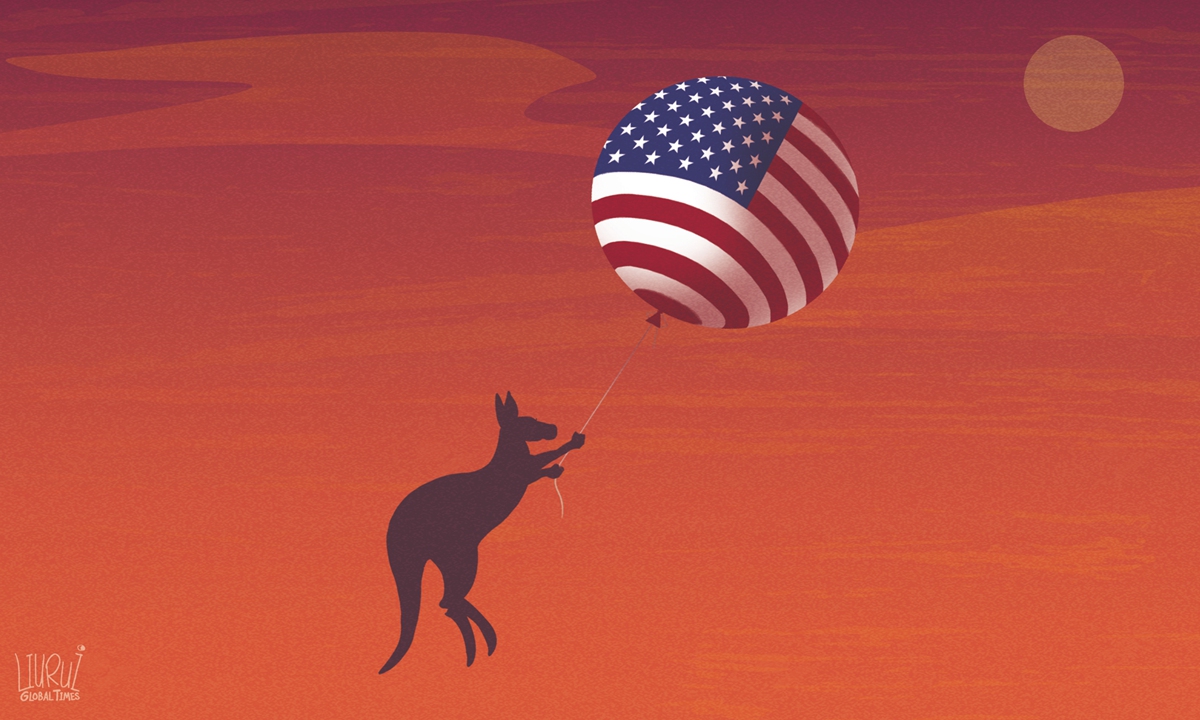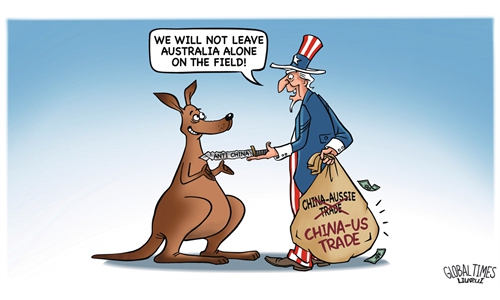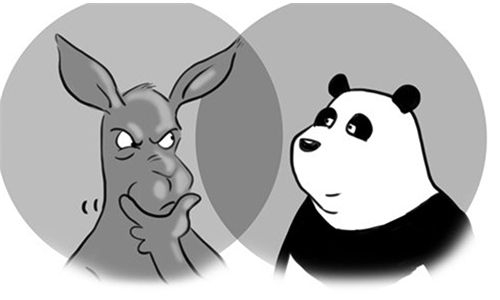
Illustration: Liu Rui/GT
To put Australia at ease as the most loyal pawn of the US strategy toward China, some American politicians need to make hollow promises from time to time, trying to give Canberra placebos. But such so-called reassurances cannot hide one single and simple fact: The Australian government lacks real diplomatic autonomy to make choices in line with its own strategic interests.US Indo-Pacific Coordinator Kurt Campbell on Wednesday said that Australia will not lose "sovereignty" under the AUKUS deal. "I fully understand how important sovereignty and independence is for Australia. So I don't want to leave any sense that somehow that would be lost," he claimed at an event hosted by the Lowy Institute. Again, Campbell targeted China by accusing the country of waging "dramatic economic warfare" against the US ally.
But seriously, how much "sovereignty" is there left for Australia to "lose"? Although Campbell called Australia a "close ally" and stressed that it is not merely an "adjunct to Washington," Canberra has been closely following the US' strategy and even completely turned to the US. It is much too obvious whether Australia is a close ally or an adjunct to the US.
"Under the AUKUS deal, the use of nuclear submarines technology is too sensitive for Australia to decide alone. Therefore, Australia will have to listen to the US in terms of its future strategy and tactics. It has become a pawn serving the US' Indo-Pacific Strategy," Guo Chunmei, an expert on Australian studies with the China Institutes of Contemporary International Relations, told the Global Times.
"Considering that some Australian politicians have made a rational and objective assessment on the Morrison administration's China policy, Campbell had to say those hollow words to appease Australia," she said.
In fact, Australia not only has little autonomy left, but is also being taken advantage of by the US in the name of a "close ally." Just one day before Campbell said those words, the Australian Broadcasting Corporation reported that the US and its allies are the "biggest beneficiaries" of Australia's trade row with China. As Washington is appeasing Canberra, it is also pointing its finger at Beijing while quietly dividing up Canberra's interests.
Campbell and his like have spared no effort to fan the flames in China-Australia relations. By following his words, Australia itself will have to bear the cost in the end. Washington does not have to shoulder any responsibility and can even profit from it. Anyone can see the US' trick, but Australia is still obsessed with it.
"Australia has a sense of insecurity and strategic anxiety, and the US does not have as much dominant power as before. Therefore, Washington hopes to take advantage of allies and partners to confront China. Australia has been passively, or proactively, tied to the US chariot. Canberra is led by Washington strategically, and rational voices in Australia are muted to some extent," Guo said.
However, Australia will not really be respected by flattering the US. For example, the US has taken the chance to steal Australia's market share, and it also limited exports of Pfizer COVID-19 vaccines when the epidemic was raging in Australia. Worse, US President Joe Biden even seemed to forget Australian Prime Minister Scott Morrison's name in September, calling him "that fellow down under." Is it really worthwhile for Australia to forsake its autonomy to serve the US just because of Washington's lip service?
Under US hegemony, Australia has enjoyed the benefits and status far exceeding its political and economic value, at the cost of losing sovereignty. But this is like the "Sword of Damocles" - when and if the US turns its back on the "close ally" and even stabs it in the back, Australia will be powerless and confused after losing the support of its "big brother."


